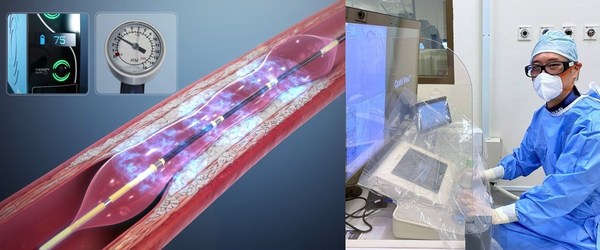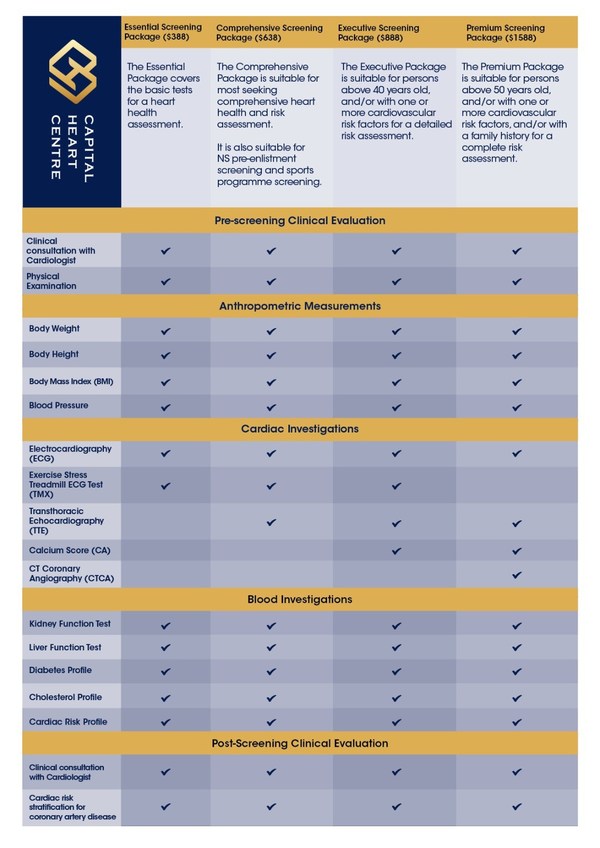SINGAPORE, Oct. 5, 2021 /PRNewswire/ -- According to the Ministry of Health Singapore, coronary heart disease accounted for 20.5% of all deaths in Singapore in 2020. In this article, Dr Joshua Loh, Senior Consultant Interventional Cardiologist from Capital Heart Centre, shares the techniques of Percutaneous Coronary Intervention (PCI) to treat coronary heart disease and how they have advanced over the years.
Coronary Angioplasty and Stenting
Coronary artery disease (CAD) occurs when the major blood vessels that supply the heart become damaged or diseased. This is caused by plaque build-up (cholesterol deposits) along the lining of an artery, disrupting blood flow to the heart and starving it of oxygen.
Before the advent of angioplasty in 1977, CAD was conventionally treated with a Coronary Artery Bypass Graft (CABG). This involves taking healthy blood vessels from the chest, arm or leg to create a graft to bypass the blocked coronary arteries, providing a new path for the blood to flow around the blocked artery.
Advances in technology brought about a minimally invasive alternative, Percutaneous Coronary Intervention (PCI) or coronary angioplasty. This procedure involves the insertion of a small balloon catheter into the narrowed or blocked artery to widen the narrowing. This improves the blood flow to the heart muscles. Often, a heart stent will also be implanted, which will act as an internal scaffolding to prop the artery open and reduce the chances of re-narrowing.
Current Advances in PCI
Since its inception in 1977, innovations in PCI with better techniques and devices have opened up treatment options to patients with complex coronary artery disease who, in the past, may only be treated with coronary bypass surgery or medications alone.
Coronary stents
For example, new generation drug-eluting stents (DESs) use biocompatible alloys which are more flexible to implant and coated with anti-inflammatory drugs. In some cases, Bioresorbable scaffolds (BRS) can also be used in its place, which is non-permanent and resorbed over time. After resorption, natural vessel pulsatile movement resumes.
Intracoronary imaging
Stenting results have also been optimised with the help of intracoronary imaging. Advanced imaging catheters such as Intravascular Ultrasound (IVUS) and Optical Coherence Tomography (OCT) provide accurate visualisation of the vessel size and characteristics of the narrowing, hence allowing more precise sizing and placement of the stent.
Vascular access
Traditionally, transfemoral access (TFA) through the groin was used to access the narrowing. At present, transradial access (TRA), a radial artery in the wrist, is used — reducing bleeding, vascular complications and improving patient comfort.
Coronary physiology
Beyond coronary angiograms to determine the severity of a narrowing, the Fractional Flow Reserve (FFR) can help objectively discern whether more intermediate forms of narrowing require PCI. This process involves an ultra-thin wire sensor inside the coronary artery that measures the pressure before and after the narrowing.
Calcium treatment
As a result of atherosclerosis, calcification of the plaque can occur, making the narrowing harder to treat as a conventional balloon would often be inadequate to crack open the rock-hard calcium deposits.
A highly specialised technique called atherectomy utilises a diamond-encrusted drill within the coronary artery to crack the calcium. A newer approach involves the use of a lithotripsy balloon, which emits multiple shockwave pulses to fracture the calcium.
Robotic Percutaneous Coronary Intervention (R-PCI)
In some cases, Dr Joshua Loh also performs Robotic Percutaneous Coronary Intervention (R-PCI). Taking advancements further, robotic percutaneous coronary intervention (R-PCI) provides a new approach to the procedure, allowing the Cardiologist to remotely control technology to manipulate guidewires and catheter devices with greater depth perception, range of movement and accuracy. This combines the Cardiologist's skill, critical thinking and eye for detail with the precision of a machine.
About Dr Joshua Loh
Dr Joshua Loh is a Senior Consultant Interventional Cardiologist and the Medical Director at Capital Heart Centre and has over 15 years of experience in the field of cardiology, with expertise in treatment with complex coronary intervention procedures.
He is experienced in using contemporary technologies in evaluating and managing coronary artery disease. He is proficient in providing coronary functional and physiology assessment using the flow wire, intracoronary imaging using Optical Coherence Tomography (OCT) and IntraVascular UltraSound (IVUS), performing complex coronary interventions such as left main disease, bifurcations, chronic total occlusions, bypass graft interventions, multivessel coronary angioplasty and treating severely calcified coronary artery disease with specialised devices such as Rotational Atherectomy and Intravascular Lithotripsy.
Capital Heart Screening Packages
Essential Screening
• Basic tests for a heart health assessment. $388 | Comprehensive Screening
• Comprehensive heart health and risk assessment. • Also suitable for NS pre-enlistment screening and sports programme screening.
$588 | Executive Screening
• Advisable for persons above 40 years old, and/or with one or more cardiovascular risk factors for a detailed risk assessment.
$888 | Premium Screening
• Suitable for persons above 50 years old, and/or with one or more cardiovascular risk factors, and/or with a family history for a complete risk assessment.
$1388 | |
Pre-screening Clinical Evaluation | ✔️ | ✔️ | ✔️ | ✔️ |
Anthropometric measurements | ✔️ | ✔️ | ✔️ | ✔️ |
Blood Investigations | ✔️ | ✔️ | ✔️ | ✔️ |
✔️ | ✔️ | ✔️ | ✔️ | |
✔️ | ✔️ | ✔️ | ||
✔️ | ✔️ | ✔️ | ||
✔️ | ✔️ | |||
✔️ | ||||
Post-screening Clinical Evaluation | ✔️ | ✔️ | ✔️ | ✔️ |
See more information here: Capital Heart Centre Cardiac Screening
About Capital Heart Centre
Led by Dr Joshua Loh, our goal at Capital Heart Centre is to deliver prompt access to appointments, diagnostic services and procedures that are tailored to your requirements — from prevention to treatment.
Your health is our number one priority. Rest assured, all you need to do is focus on your heart health, while our warm and friendly staff takes care of the rest. The team is dedicated, experienced and trained with up-to-date medical knowledge and evidence-based practices.
Dr Joshua Loh is well-versed in all areas regarding heart health, and his expertise lies in complex coronary interventional procedures. He did his advanced training in Interventional Cardiology in Washington, DC, and the US capital gave rise to the name, Capital Heart Centre.
Website: www.capitalheart.sg
Facebook: https://www.facebook.com/capitalheart.sg
Instagram: https://www.instagram.com/capitalheart.sg/
Personal Instagram: https://www.instagram.com/drjoshualoh/
Dropbox https://www.dropbox.com/sh/z0smbvkypw8vu67/AACgbj2rPbXmpt9fiAicVELAa?dl=0



